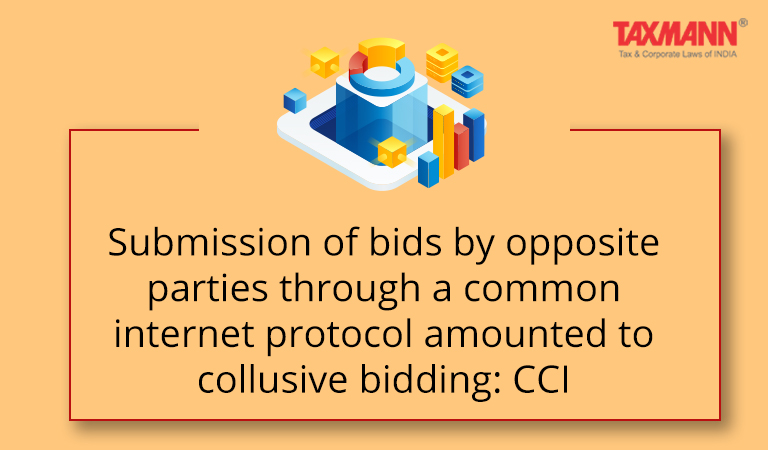Submission of bids by opposite parties through a common internet protocol amounted to collusive bidding: CCI
- Blog|News|Competition Law|
- 2 Min Read
- By Taxmann
- |
- Last Updated on 30 November, 2021

Case Details: GAIL (India) Ltd. v. PMP Infratech (P.) Ltd - [2021] 132 taxmann.com 188 (CCI)
Judiciary and Counsel Details
-
- Ashok Kumar Gupta, Chairperson
- Ms. Sangeeta Verma and Bhagwant Singh Bishnoi, Member
- Tishampati Sen and Ms. Udita, Advs. for the Appellant.
- Rishad Ahmed Chowdhury, Mukesh Patel, Ankit Jain, Ms. Anupam Sanghi, Advs and Gautam Bhesania for the Respondent.
Facts of the Case
In the instant case, an information was filed by GAIL (India) Limited (‘the Informant’) against PMP Infratech Pvt. Ltd. and Rati Engineering (‘the Opposite Parties’), alleging, contravention of the provisions of Section 3 of the Competition Act, 2002. OPs were engaged in the business of Pre-engineering, building services, road, and bridge construction services.
The Informant (GAIL), largest state-owned natural gas processing and distribution company alleged that OPs were indulged in collusive bidding in tender floated by an informant for the hiring of services, restoration of well site locations in GAIL-operated block.
The CCI considered the information and prima facie opined that it is a case of contravention of the provisions of section 3 of the Act. Accordingly, the Commission directed the Director-General to cause an investigation to be made into the matter under the provisions of section 26(1) of the Act.
CCI Held
CCI noted that OPs submitted their bids for impugned tender from a common internet protocol on two different dates, with a gap of one day. OPs had reached an understanding by and between them whereby and whereunder they decided to coordinate their conduct in submitting their respective bids.
During the investigation, the Director of OP also confirmed that bids for two companies were indeed submitted from the office premises of OP. Further, the e-mail dump of OPs had revealed that OPs were in regular touch with each other during the relevant period when the tender was issued.
It was evident that these provisions not only proscribe the agreements which cause Appreciable Adverse Effect on Competition (AAEC), but the same also forbid the agreements which are likely to cause AAEC.
The Commission, directed OPs, to cease and desist in the future from indulging in practices which have been found in the present order to be in contravention of the provisions of section 3 of the Act.
Disclaimer: The content/information published on the website is only for general information of the user and shall not be construed as legal advice. While the Taxmann has exercised reasonable efforts to ensure the veracity of information/content published, Taxmann shall be under no liability in any manner whatsoever for incorrect information, if any.

Taxmann Publications has a dedicated in-house Research & Editorial Team. This team consists of a team of Chartered Accountants, Company Secretaries, and Lawyers. This team works under the guidance and supervision of editor-in-chief Mr Rakesh Bhargava.
The Research and Editorial Team is responsible for developing reliable and accurate content for the readers. The team follows the six-sigma approach to achieve the benchmark of zero error in its publications and research platforms. The team ensures that the following publication guidelines are thoroughly followed while developing the content:
- The statutory material is obtained only from the authorized and reliable sources
- All the latest developments in the judicial and legislative fields are covered
- Prepare the analytical write-ups on current, controversial, and important issues to help the readers to understand the concept and its implications
- Every content published by Taxmann is complete, accurate and lucid
- All evidence-based statements are supported with proper reference to Section, Circular No., Notification No. or citations
- The golden rules of grammar, style and consistency are thoroughly followed
- Font and size that’s easy to read and remain consistent across all imprint and digital publications are applied



 CA | CS | CMA
CA | CS | CMA
